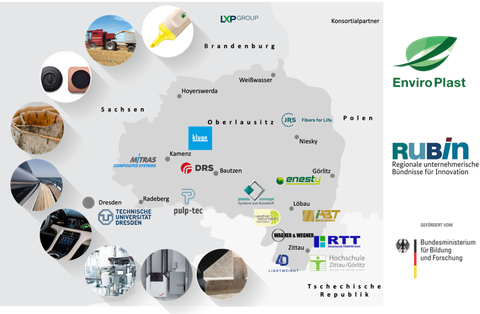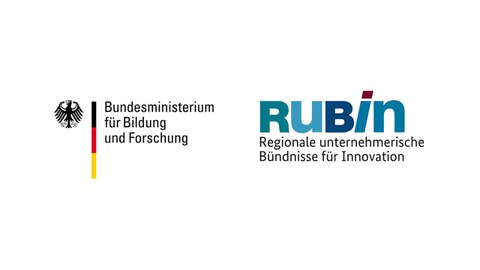01.06.2024
EnviroPlast

Konsortialpartner EnviroPlast
Nachhaltige Kunststoffteile aus biogenen Reststoffen für die umweltgerechte Zukunft der Fahrzeug- und Bauindustrie (EnviroPlast)
|
Laufzeit |
06/2024 – 05/2027 |
|
Finanzierung |
PTJ | BMBF |
|
Förderkennzeichen |
03RU3U011C / 03RU3U012A |
|
Kontakt |
|
|
Schlagworte |
Reststoffe, Nachhaltigkeit, Ressourcenschonung, Naturfaser, Kunststoffe |
Das RUBIN-Bündnis will biogene Neben- und Reststoffe gezielt als Rohstoff sowohl zur Herstellung von Biopolymeren als auch als Verstärkungs- und Füllstoff einsetzen. Hierzu eignen sich insbesondere faserhaltige Reststoffe, wie etwa Schnittholz aus dem Sägewerk, Getreidestroh, Spreu, Schäben und viele Grünabfälle. Die stoffliche Nutzung biogener Reststoffe ist bisher noch auf einem sehr niedrigen Niveau: Allein in Deutschland fallen jährlich bis zu ca. 200 Mio. Tonnen faserhaltige Reststoffe an. Doch bisher bleiben diese weitgehend ungenutzt oder werden nur einer geringwertigen Nutzung zugeführt (i.d.R. als Brennstoff oder Einstreu). EnviroPlast will das ändern.
Durch die Nutzung faserhaltiger Reststoffe zur Herstellung von Biokunststoffen und Biocomposites lässt sich die Belegung zusätzlicher Agrarflächen zum Anbau von Rohstoffen für die Kunststoffproduktion deutlich verringern. Um den gegenwärtigen Bedarf an Kunststoffen in Deutschland durch konventionelle Agrarprodukte - als Grundlage zur Herstellung von Biopolymeren – zu decken, wären bis zu 60 Prozent der bestehenden Agrarflächen Deutschlands erforderlich. Dies hätte weitreichende Auswirkungen insbesondere für die Lebensmittelgewinnung zur Folge. EnviroPlast will dieses Problem lösen, ohne bisherige Wirtschaftsprozesse und Lebensgewohnheiten stark zu verändern. So verbindet das RUBIN-Bündnis Nachhaltigkeit mit Wirtschaftlichkeit.
Der Einsatz faserhaltiger Reststoffe als Füllstoff in Kunststoffen – als zweites wesentliches Projektziel – verringert den erforderlichen Kunststoffanteil bzw. den Einsatz synthetischer Fasern und Additive. Das reduziert nicht nur den CO2-Fußabdruck des produzierenden Unternehmens, sondern spart auch Materialkosten ein.
EnviroPlast will eine hohe Qualität der Kunststoffteile aus biogenen, regionalen Reststoffen erzielen - entsprechend der spezifischen Anforderungen der Fahrzeug- und Bauindustrie. Dazu verfolgt das RUBIN-Bündnis einen ganzheitlichen Ansatz, der die gesamte Wertschöpfungskette berücksichtigt – von der Ernte über die Bauteilherstellung bis hin zum Endanwender und dem stofflichen Recycling.
Die TU Dresden ist im Verbund 1 („Reststoffbereitstellung und -aufbereitung zur stofflichen Nutzung“) mit dem Teilvorhaben „Entwicklung/Charakterisierung neuartiger Bereitstellungs- und Aufbereitungsverfahren von Restbiomasse zur Weiterverarbeitung in thermoplastische NFK/WPC Granulate“ beteiligt. Hier werden die zur Verfügung stehenden Reststoffe analysiert und für die Compoundierung aufbereitet. Dabei werden neben der Verarbeitungsfähigkeit auch die chemische Zusammensetzung, die physikalischen und die anatomischen Eigenschaften dieser Reststoffe untersucht. Die gewonnenen Erkenntnisse werden im Projekt genutzt, um Füllstoffe und Verstärkungsfasern optimal einzusetzen. Dadurch sollen die hohen Anforderungen des Compoundierens und der Herstellung von Bauteilen mit Kunststoffen erfüllt werden.
Im Verbund 2 („Halbzeugherstellung“) ist die TU Dresden mit dem Teilvorhaben „Entwicklung neuartiger thermoplastischer Halbzeuge aus regionalen landwirtschaftlichen Reststoffen“ eingebunden. Darin wird der Prozess der Compoundierung für die ausgewählten Reststoffe untersucht und für den industriellen Prozess optimiert. Dabei werden die zur Verfügung stehenden Reststoffe mit verschiedenen Kunststoffen compoundiert und mittels mechanischer Prüfungen analysiert. Die entsprechenden Compoundmischungen werden passgenau für die geplanten Anwendungen ausgewählt und die Verarbeitung im Extrusions- und Spritzgussverfahren ermöglicht.
Die Ergebnisse der beiden Teilvorhaben der TU Dresden fließen in die Arbeiten des Verbundes 3 („Kunststoffverarbeitung und Bauteilherstellung“) ein. Ziel ist hier, die aufbereiteten Reststoffe und entwickelten Halbzeuge in konkrete Bauteile aus dem Schienen- und Fahrzeugbereich sowie Baubereich zu überführen.
Partner
4D-LIGHTweight GmbH
Bauteil- und Prozessoptimierung mittels Additiver Fertigung
BASF SE Polyamides & Compounds (assoziiert)
Globales Portfolio an technischen Kunststoffen für innovative E&E-Anwendungen in der Industrie-, Unterhaltungs- und Automobilelektronik
CTL Lodenau GmbH & Co.KG
Werkstoffrückgewinnung im Straßenbau und Aufschluss von Holzreststoffen
DRS - Rohrwerke Sachsen GmbH Kunststoffrohre
Systemanbieter für hochwertige Kabelschutz-, Lüftungs- und Kaminrohre sowie Sonderlösungen
eco-softfibre GmbH & Co.KG (assoziiert)
Herstellung umweltfreundlicher Bio-Schaumstoff aus Naturmaterial
enesty GmbH
Maßgeschneiderte Lösungen in den Bereichen Spritzgießwerkzeuge, Temperierung und additive Fertigung
Entwicklungsgesellschaft Niederschlesische Oberlausitz mbH (assoziiert)
Umfassende Projektentwicklung und -umsetzung sowie Unternehmensbegleitung
HS Timber Productions GmbH (assoziiert)
Traditionsreiches holzverarbeitendes Unternehmen
Initiative angewandte Biomasse Technologie Oberlausitz UG
Bereitstellung/Bergung/Aufbereitung von Roh- und Reststoffen mittels neuartiger Ernteverfahren
kluge GmbH (Bündniskoordinator)
Hersteller komplexer Maschinen und Anlagen insbesondere für Ernte- und Aufbereitungstechnik
Landwirtschaftsbetrieb Hartmann (assoziiert)
Nachhaltiger und umweltgerechter Landwirtschaftsbetrieb in der 4. Generation
Lausitzer Naturfaser Ebersbach UG
Individuelle Faseraufbereitungs- und Formgebungsverfahren zur Herstellung ökologischer Verpackungen
LXP Group GmbH
Industrielle Biotechnologie zur ökonomischen und ökologischen Verarbeitung v. Pflanzenresten
Menzolit GmbH (assoziiert)
Herstellung von Bio-SMC/BMC aus Reststoffen
Mitras Composites Systems GmbH
Entwicklung und Produktion komplexer SMC- und BMC-Bauteile von der klein- bis hin zur Großserie
Plastic Concept GmbH
innovative Lösungen und Produkte für die Automobilindustrie
PulpTec Compound GmbH & Co.KG
Moderne Compoundiertechnik zur Aufbereitung von Thermoplasten und deren Verbundwerkstoffe
PUS Produktions- und Umweltservice GmbH (assoziiert)
Aufbereitungs- und Siebtechnik f. Forschungszwecke
RTT System GmbH
Spezialisierte Lösungen zur Sortierung und Aufbereitung verschiedenster Abfälle
Siemens Mobility Austria GmbH (assoziiert)
Schienenfahrzeugbau insbesondere Entwicklung kunststoffbasierter Schienenfahrzeugkomponenten und Erfüllung der bahnspezifischen Anforderungen
Volkswagen AG (assoziiert)
Anwender von biobasierten Interieur-, Konstruktions- und Strukturbauteilen
Fraunhofer Kunststoffzentrum Oberlausitz (assoziiert)
Naturfaserverstärkte Kunststoffbauteile, Additive Fertigung
Wagner & Wegner UG
Spezialist bei der Verarbeitung und Formgebung von textilen Reststoffen
Hochschule Zittau/Görlitz, Professur für funktionsintegrierende Kunststofftechnologien
Kunststoffverarbeitung, Naturfaserverbundwerkstoffe, nachhaltige Produktion
TU Dresden, Professur für Holztechnik und Faserwerkstofftechnik
Kaskadierte bioökonomische Produkt- und Prozessentwicklungen sowie Werkstoffkombinationen

